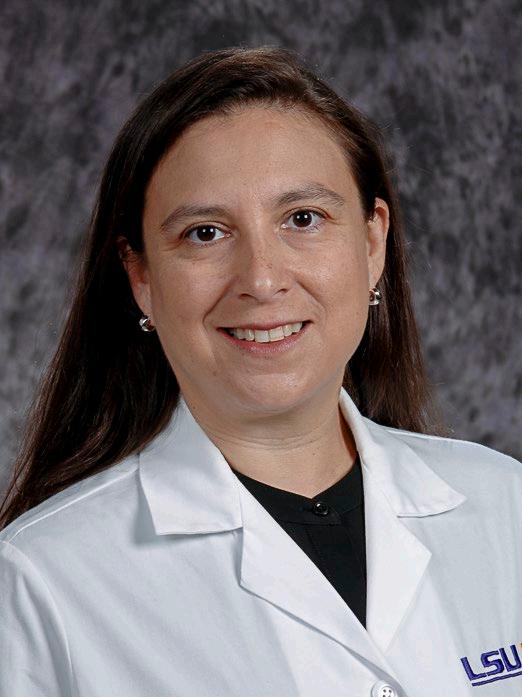
5 minute read
Research Spotlight
RESEARCH FUNDING SPOTLIGHT
Dr. Reggie Lee Receives a Five Year Grant from the National Institutes of Health to study serum and glucocorticoidregulated kinase 1 (SGK1) in the Brain .
Advertisement
Reggie Lee, PhD, Assistant Professor of Neurology, has been awarded $1.83 million for a total of five years of funding from the National Institutes of Health to study SGK1 signaling in the brain after cardiopulmonary arrest. Cardiac arrest is a major cause of death/disability in the US affecting more than 325,000 people per year with only a 10% survival rate. Dr. Lee’s longterm goal is to decrease brain damage by reviving cerebral blood flow, thus diminishing subsequent neurological deficits. Additionally, Dr. Lee would like to modulate SGK1 signaling, a major player in the brain thought to be involved in metabolism, aging, and diabetes to afford better outcomes after brain ischemia.


Dr. Celeste Wu LSU Health Shreveport post-doctoral fellow, receives Career Development Award from American Heart Association
Celeste Y.C. Wu, PhD, Postdoctoral Fellow in the Department of Neurology, was awarded the American Heart Association Career Development Award. Dr. Wu received $231,000 in funding and will be the principal investigator (PI) exploring the role of enzyme catalysts in age-induced vascular dementia.
Dr. Kevin Lin Receives a Three-Year Grant from the American Heart Association to Study Neurovascular Dysfunction in Alzheimer’s Disease
Kevin Lin, PhD, Associate Professor of Neurology, has been awarded $300,000 for a total of 3 years of funding from the American Heart Association to study neurovascular function in Alzheimer’s disease. Dr. Lin’s long-term goal is to decrease brain damage by reviving cerebral blood flow thus diminishing subsequent neurological deficits. The goals of this funded project is to investigate protein arginine methyltransferase 4, an enzyme that is elevated in Alzheimer’s disease patients. Regulation of this enzyme can provide novel insights into the therapeutic opportunities of Alzheimer’s disease.
RESEARCH SPOTLIGHT

Dr. Roger Kelly
LSUHS, BRF Partnering on National Alzheimer’s Study
By Linnea Allen, KTBS TV
Roger Kelley, MD, Professor in the Department of Neurology, is the local principal investigator of a national study sponsored by the Alzheimer’s Association and American College of Radiology. LSU Health Shreveport and the Biomedical Research Foundation’s Center for Molecular Imaging and Therapy have partnered to bring the IDEAS (Imaging Dementia-Evidence for Amyloid Screening) study to Northwest Louisiana. The study, which will focus on minority populations in underserved areas, uses a PET scan (positron emission tomography) of the brains of people with mild cognitive impairment and dementia to locate beta-amyloid plaque, a contributing factor to Alzheimer’s disease formation pathology. Understanding the link between plaque formation and cognitive decline, especially in a diverse population, is critically important in the development of dementia treatment for all.
Media Coverage: KTBS 3 ABC
RESEARCH SPOTLIGHT

Biochemically identify dysregulated factors in DYT1 dystonia via iPSC-derived neurons
Dr. Baojin Ding’s research in the Ding Lab focuses on cellular and molecular neuroscience and neurological diseases. Specifically, they use patient-specific neurons to determine the pathogenesis of neurological diseases and seek novel molecular targets for therapeutic interventions. Currently, the projects in the Ding Lab are supported by DOD and NIH grants and the Center for Brain Health Spring 2022 Grant and Aid.
The research efforts in Dr. Ding’s laboratory are focusing on Molecular and Cellular Neuroscience and related Neurological Diseases. Research programs include (1) the timing mechanisms of gene expression in maturing neurons, (2) the regulations of nucleocytoplasmic transport in neurodevelopment and neurodegeneration, and (3) modeling human neurological diseases using patient-derived neurons.

RESEARCH SPOTLIGHT

Remote vs. In-person Delivery of LearningRx One-on-One Cognitive Training During the COVID-19 Pandemic: A Non-inferiority Study
Amy Lawson Moore 1, Terissa Michele Miller 1, Christina Ledbetter 1 2
The COVID-19 pandemic challenged in-person delivery of cognitive training. Some clinics pivoted to remote delivery for those impacted by lockdowns, illness, or fear of exposure to the virus. However, it was unknown if remote delivery using teleconferencing technology was as effective as in-person delivery. The current study compared the outcomes of remote delivery to in-person delivery of ThinkRx cognitive training during 2020. The sample included 381 child and adult clients from 18 cognitive training centers. One group (n = 178, mean age = 12.3) received traditional in-person delivery of cognitive training. The second group (n = 203, mean age = 11.7) received remote delivery of one-on-one cognitive training via Zoom teleconferencing. Each client was assessed before and after the intervention using the Woodcock Johnson IV Tests of Cognitive Abilities. Clients completed an average of 112 h of cognitive training delivered by a clinician in 90-min sessions 3 or 4 days per week. Paired samples t-tests revealed significant differences from pretest to post-test across all constructs for both groups. After Bonferroni correction, MANOVA revealed no significant difference in changes scores between the two intervention groups on any of the subtests. With very small effect sizes, linear regression analyses indicated that age was a significant predictor of change in working memory and processing speed for the in-person group, and a significant predictor of change in overall IQ score for the teletherapy group. Non-inferiority analyses indicated remote delivery is not inferior to inperson delivery on the primary outcome measure of overall IQ score along with processing speed, fluid reasoning, long-term memory, and visual processing. Although in-person training results were slightly higher than remote training results, the current study reveals remote delivery of cognitive training during COVID-19 was a viable alternative to in-person delivery of cognitive training with little practical differences based on the age of client.







